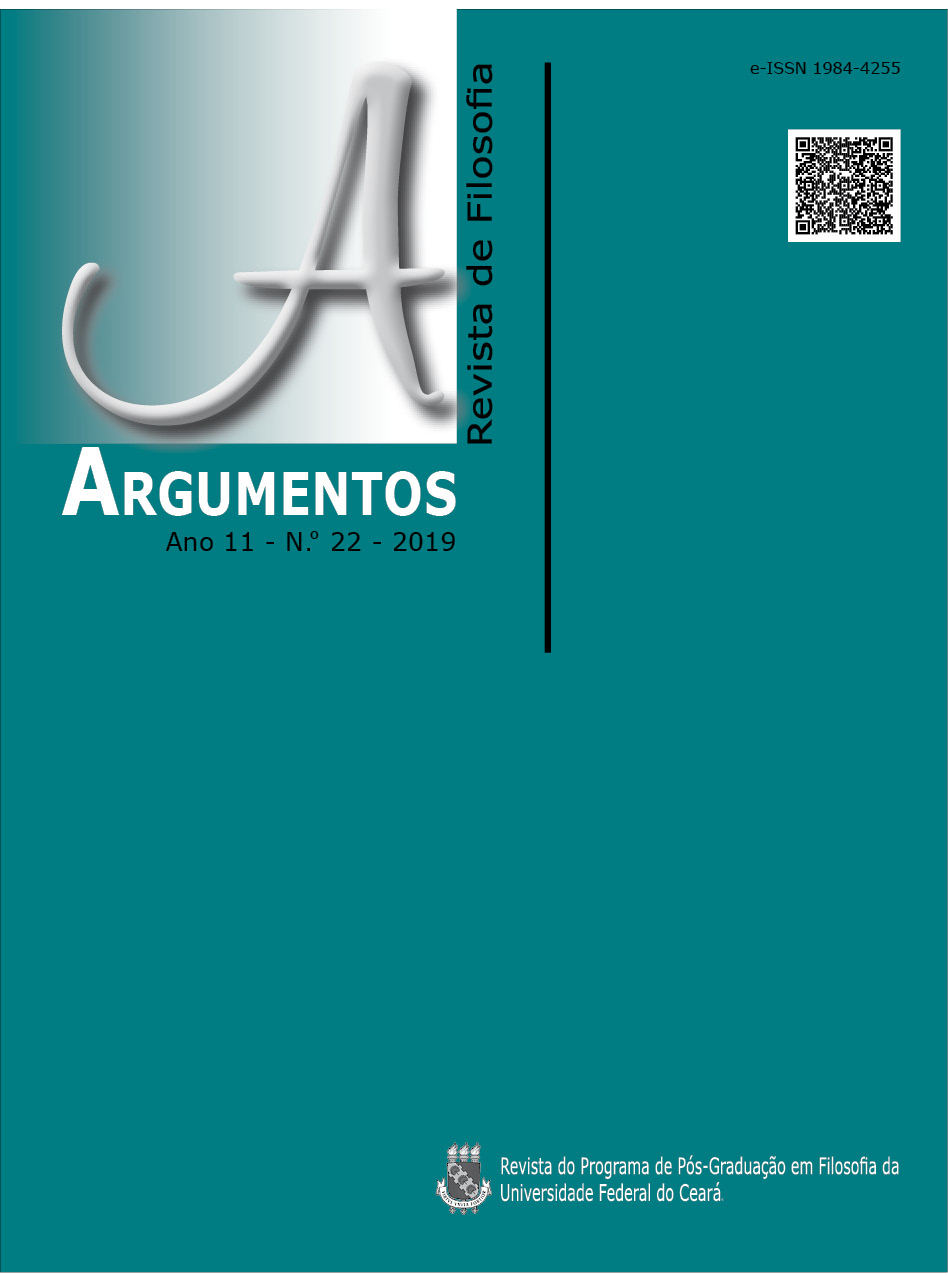An intermediate term functor logic
DOI:
https://doi.org/10.36517/Argumentos.22.2Keywords:
Plus-minus algebra. Non-classical quantifiers. Common sense reasoning.Abstract
In this paper we attempt to do something rather simple: to meet the advances of Sommers and Englebretsen (namely, a plus-minus algebra for syllogistic) together with the developments of Peterson and Thompson (namely, an extension of syllogistic with “most,” “many,” and “few”). The result is an intermediate syllogistic that copes with a wide range of logical patterns but with the virtues of an algebraic approach.
Downloads
References
CARNAP, Rudolf. Die alte und die neue Logik. Erkenntnis, 1, 12–26, 1930.
ENGLEBRETSEN, George. The New Syllogistic. Peter Lang, 1987.
ENGLEBRETSEN, George. Linear Diagrams for Syllogisms (with Relationals). Notre Dame J Formal Logic 33(1), 37–69, 1991.
ENGLEBRETSEN, George. Something to Reckon with: The Logic of Terms. University of Ottawa Press, 1996.
ENGLEBRETSEN, George and SAYWARD, Charles. Philosophical Logic: An Introduction to Advanced Topics. Bloomsbury Academic, 2011.
GEACH, Peter. Reference and Generality: An Examination of Some Medieval and Modern Theories. Cornell University Press, 1962.
GEACH, Peter. Logic Matters. University of California Press, 1980.
KHEMLANI, Sangeet and JOHNSON-LAIRD, Philip. Theories of the Syllogism: a Meta-Analysis. Psychological Bulletin, 427–457, 2012.
KUHN, Steven. An Axiomatization of Predicate Functor Logic. Notre Dame J Formal Logic 24(2), 233–241, 1983.
MOSS, Lawrence. Natural Logic. In: Lappin, S., Fox, C. (eds.) The Handbook of Contemporary Semantic Theory, John Wiley & Sons, 2015.
MOSTOWSKI, Anderzj. On a Generalization of Quantifiers. Fundamenta Mathematicae 44(2):12–36, 1957.
MOZES, Eyal. A Deductive Database Based on Aristotelian Logic. Journal of Symbolic Computation 7(5):487–507, 989.
MURPHREE, Wallace. Numerical term logic. Notre Dame J Formal Logic, 39(3):346–362, 1998.
NOAH, Aris. Predicate-functors and the Limits of Decidability in Logic. Notre Dame J Formal Logic 21(4):701–707, 1980.
NOAH, Aris. Sommers’s Cancellation Technique and the Method of Resolution. In: Oderberg, D. (ed.) The Old New Logic: Essays on the Philosophy of Fred Sommers, Bradford, pp. 169–182, 2005.
PAGNAN, Ruggero. A Diagrammatic Calculus of Syllogisms. Journal of Logic, Language and Information 21(3):347–364, 2012.
PETERSON, Philip. On the Logic of “Few”, “Many”, and “Most”. Notre Dame J Formal Logic 20(1):155–179, 1979.
QUINE, Willard Van Orman. Predicate Functor Logic. In: Fenstad, J.E. (ed.) Proceedings of the Second Scandinavian Logic Symposium, North-Holland, 1971.
SOMMERS, Fred. On a Fregean Dogma. In: Lakatos, I. (ed.) Problems in the Philosophy of Mathematics, Studies in Logic and the Foundations of Mathematics, v. 47, Elsevier, pp. 47–81, 1967.
SOMMERS, Fred. The Logic of Natural Language. Oxford University Press, 1982.
SOMMERS, Fred. Intelectual Autobiography. In: Oderberg, D. (ed.) The Old New Logic: Essays on the Philosophy of Fred Sommers, Bradford, pp. 1–24, 2005.
SOMMERS, Fred and ENGLEBRETSEN, George. An Invitation to Formal Reasoning: The Logic of Terms. Ashgate, 2000.
THOMPSON, Bruce. Syllogisms using “Few”, “Many”, and “Most”. Notre Dame J Formal Logic 23(1):75–84, 1982.
THOMPSON, Bruce. Syllogisms with Statistical Quantifiers. Notre Dame J Formal Logic 27(1):93–103, 1986.
VEATCH, Henry Babcock. Intentional Logic: a Logic Based on Philosophical Realism. Archon Books, 1970.
WESTERSTÅL, Dag. Aristotelian Syllogisms and Generalized Quantifiers. Studia Logica 48(4):577–585, 1989.
Downloads
Published
Versions
- 2025-03-28 (2)
- 2019-11-18 (1)
How to Cite
Issue
Section
License
Copyright (c) 2019 Argumentos - Revista de Filosofia

This work is licensed under a Creative Commons Attribution 4.0 International License.
Argumentos magazine is licensed under an International Creative Commons Attribution License.
The Magazine uses CC BY inclusion
1) The authors retain the copyright granted to the magazine or the right to initial publication, with the work regularly licensed under the Creative Commons Attribution, which allows the sharing of the work with acknowledgment of authorship and initial publication in this magazine.
2) The authors are authorized to contract additional applicable contracts, for non-exclusive distribution of the version of the work published in this journal (for example, publication in the institutional repository or as a chapter of the book), recognition of authorship and initial publication in this journal.
3) Authors are authorized and encourage to publish and distribute their work online (for example, in institutional repositories or on their personal pages) at any time before or during the editorial process, as they can generate productive changes, as well as increase the impact and reference of published work.




.jpg)










._._3.png)
1.jpg)
._._._.png)
